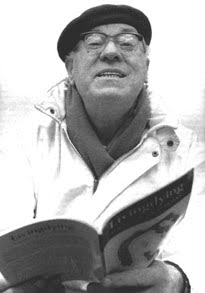Cid Corman, 'Enuresis'
LISTEN TO THE SHOW
 Back in 2001 the people of the Kelly Writers House wanted to bring Cid Corman — long by then a resident of Kyoto, Japan — to Philadelphia to be with us, give a reading, meet some of his readers. But one thing or another — cost, Cid’s health — made this impossible. So we set up a combination of a phone link to Cid in Kyoto and a live audiocast feed; in this way, the fifty of us in the Arts Café of the Writers House and another 75 or so listening on their computers around the world were able to enjoy a reading by Cid, ask him questions, and make at least that limited sort of contact with the founder of Origin, crusty prolific exile, author of tens of thousands of poems. The November 2001 event was moderated by PoemTalk’s producer and host, Al Filreis, along with Frank Sherlock, Fran Ryan, and Tom Devaney.
Back in 2001 the people of the Kelly Writers House wanted to bring Cid Corman — long by then a resident of Kyoto, Japan — to Philadelphia to be with us, give a reading, meet some of his readers. But one thing or another — cost, Cid’s health — made this impossible. So we set up a combination of a phone link to Cid in Kyoto and a live audiocast feed; in this way, the fifty of us in the Arts Café of the Writers House and another 75 or so listening on their computers around the world were able to enjoy a reading by Cid, ask him questions, and make at least that limited sort of contact with the founder of Origin, crusty prolific exile, author of tens of thousands of poems. The November 2001 event was moderated by PoemTalk’s producer and host, Al Filreis, along with Frank Sherlock, Fran Ryan, and Tom Devaney.
Fast forward. Cid Corman died in 2004. Bob Arnold, Philip Rowland, Jack Kimball, Joe Massey and others have worked hard to keep Cid’s poems within the view of readers — especially Bob Arnold whose Longhouse Press published The Next One Thousand Years, the Selected Poems of Cid Corman. And then, as part of the PoemTalk series, we staged a mini-reunion of the November 2001 Cormanite moderators, Fran, Tom, Frank and Al, to talk about one of our favorite poems, “Enuresis.”
It means bed-wetting. The poem puts forward this audacious claim to understanding: I know the terror you’ve experienced in the midst of war because as a child I held my urine close to me for fear of my parents’ terrifying enmity. The claim is made with such poetic consciousness (at the level of word choice and meter - and in the spoken performance) that one hardly doubts the power of the homefront psychic terror being remembered.
October 5, 2009
Caterpillar
'A magazine of the leaf, a gathering of the tribes'
Begun in 1966 by Clayton Eshleman as a series of chapbooks by writers such as Jackson MacLow, David Antin, and Louis Zukofsky, Caterpillar Books became Caterpillar: A Gathering of the Tribes (though the subtitle was quickly dropped) in October 1967 when Eshleman realized he “could cover more ground with a literary journal than with undistributable chapbooks.” In a 2008 dialogue in Jacket, Eshleman says that he “wanted to do a magazine based on Cid Corman's Origin, but one that was bigger and more burly, taking on more ‘fronts’ than Cid had engaged.”